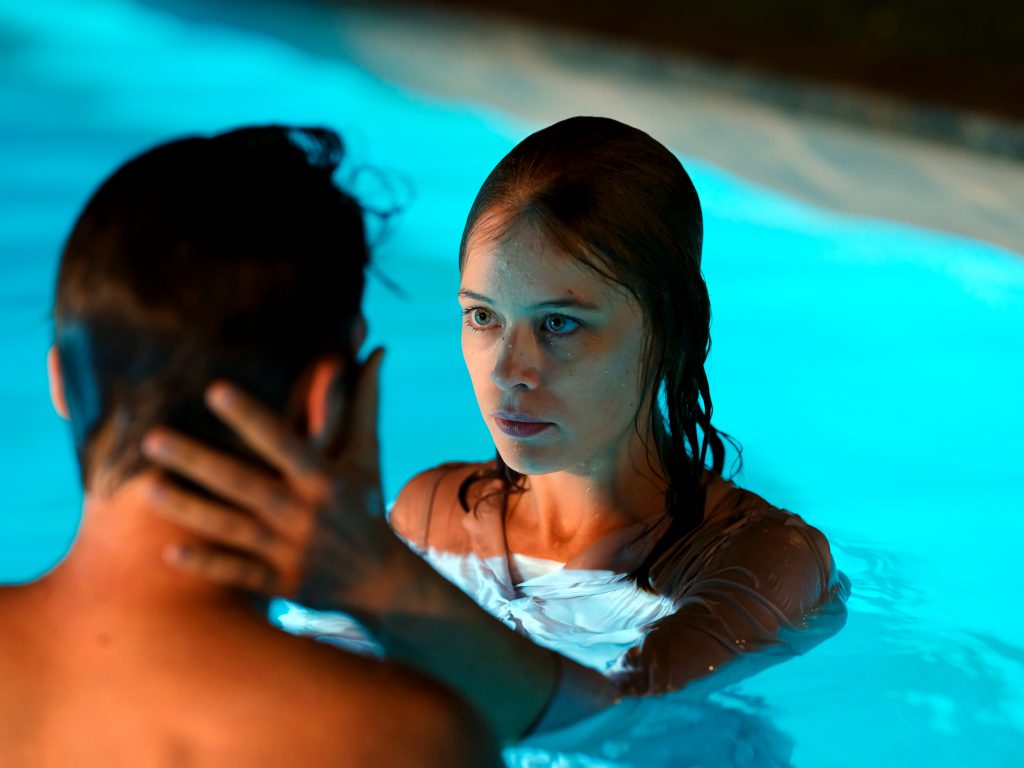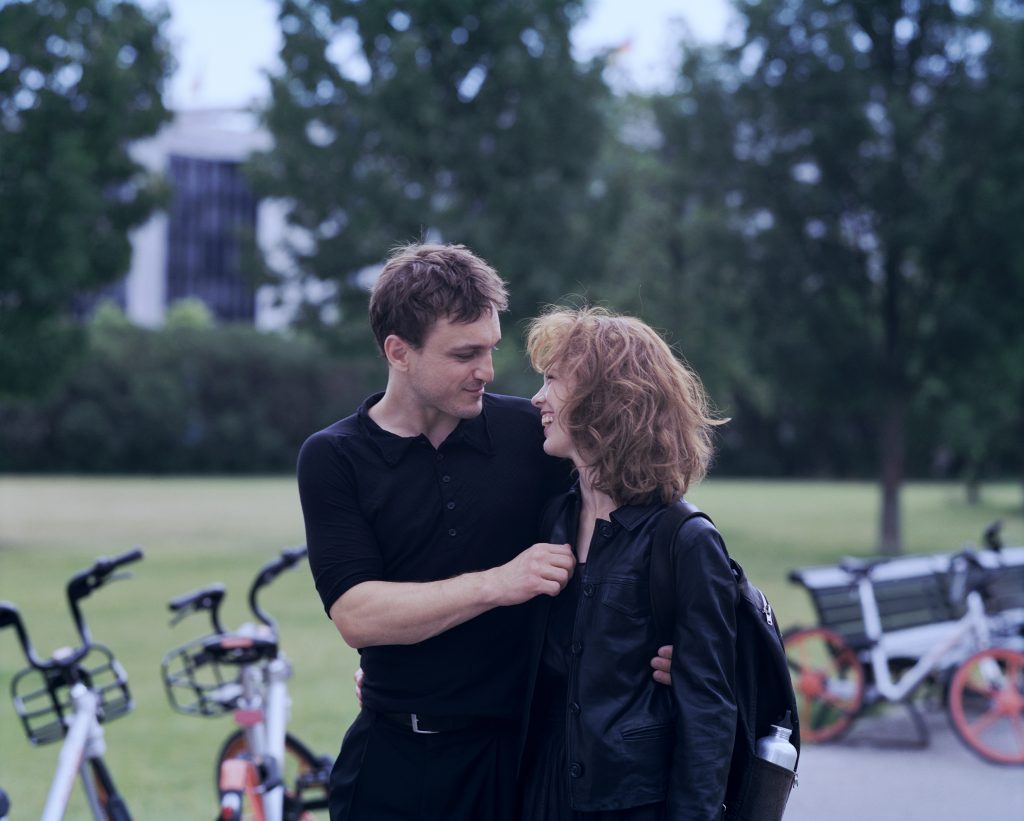July 4, 2021
by Carla Hay

Directed by Christian Petzold
German with subtitles
Culture Representation: Taking place in Berlin, the dramatic film “Undine” features an all-white cast of characters representing the working-class and middle-class.
Culture Clash: A water sprite in human form is conflicted between two human lovers and how these romances will affect whether she will live happily ever after or if she will be doomed to a life that she doesn’t want.
Culture Audience: “Undine” will appeal primarily to people who are interested in artsy European films that are contemporary interpretations of fairy tales.

Based on the fairy tale about a water sprite who takes on the form of a human, the dramatic film “Undine” unfolds like a fever dream rather than straightforward story. The movie’s visuals and acting are compelling, but might not be enough to hold the interest of people who aren’t already familiar with the Undine mythology. It’s a movie that requires patience and curiosity to see how everything is going to end, because the heroine of the story wants to defy her fate.
Written and directed by Christian Petzold, “Undine” takes place in Berlin and has some bold-risk-taking in this often-abstract version of the Undine fairytale. This movie’s title character is Undine Wibeau (played by Paula Beer), a historian who works at the Senate for Urban Development and Housing, where she gives guided tours to visitors. Much of her guided tours involves showing model replicas of what Berlin and plans fo the city’s development. Undine looks like a woman who’s in her 20s, but she’s really a water sprite who has this curse of having to kill any man who becomes her lover and betrays her.
The beginning of the movie is the break-up scene that sets in motion what follows for the rest of the story. At a cafe table directly outside the building where Undine works, she is having lunch with her soon-to-be-ex-boyfriend Johannes (played by Jacob Matschenz), who is trying to let her down easily as he ends the relationship. It’s later revealed in the story that Johannes is already romantically involved with someone else named Nora (played by Julia Franz Richter), and he doesn’t want to leave Nora to be with Undine.
As Johannes leaves the table to gets some coffee, Undine starts crying but quickly wipes away he tears when Johannes comes back to the table. She tells him ominously, “You said you love me forever. If you leave, I have to kill you. If you leave here, you have to die.”
Undine says that she has to go back to work because that she will return to the table in half and hour when she’s on her break. She tells Johannes that she expects him to be at the table when she gets back. And when she sees him again, Undine tells Johannes that he better declare his love for her. She even looks out of the building window to check and see if Johannes is still there.
If would be incorrect to assume that “Undine” is going to turn into a “Fatal Attraction” type of movie, with Undine as the jilted lover who spends most of the story stalking the man who dumped her. Instead, this artfully directed but quirky film goes in an entirely different direction. Shortly after this break-up with Johannes, Undine meets another man who becomes her next love. His name is Christoff (played by Franz Rogowski), an industrial diver with an introverted personality.
Whereas Johannes was cold and standoffish, Christoff is warm and romantic. After one of Undine’s guided tours, which had Christoff in the tour group, Christoff shyly approaches Undine, flatters her about her tour guide skills, and asks her out on a date. Undine is so distracted over her problems with Johannes that she just stares at Christoff and doesn’t give an answer.
Christoff nervously backs into a shelf, which causes the other furniture in the room to vibrate. This movement has a domino effect that ends with a very large aquarium in the room tipping over and smashing completely. The force of the water crashes over Christoff and Undine, who are both knocked to the ground.
It’s an awkward way to start a relationship, but somehow this bizarre accident quickly bonds Christoff and Undine together. They have a passionate romance, which includes their shared love of diving underwater. During one of their diving dates, Christoff demonstrates a romantic gesture by showing Undine a brick wall that has her name on it.
Christoff begins to suspect that there’s something unusual about Undine during this diving date, when she briefly disappears underwater. When Christoff sees Undine a minute or two later, she’s holding on to a dolphin, but she isn’t wearing her scuba gear. Undine suddenly passes out from lack of oxygen.
Christoff rescues Undine and gives her cardiopulmonary resuscitation (CPR), while chanting the chorus to the Bee Gees’ “Staying Alive.” (It’s one of the movie’s many quirks.) Undine makes a quick recovery and asks Christoff to do mouth-to-mouth resuscitation on her again. He’s reluctant to do so because he’s afraid someone might see them and think she’s really in distress. Christoff tells Undine that he can grant her wish when they get home.
“Undine” is filled with scenes like that, where not everything fits in a cohesive manner, but the the details of movie are presented like a jigsaw puzzle that viewers are expected to piece together on their own. Johannes isn’t completely out of the picture. There’s a pivotal scene on a bridge where Christoff and Undine are embracing each other as they walk past another couple, who are walking in the opposite direction.
The other couple are Johannes and Nora. Undine stares at Johannes, Christoff notices, and Christoff expresses some insecurity that Undine’s heart started to beat faster when she looked at the other man. Undine won’t tell Christoff about Johannes or her history with him, but this encounter plants some seeds of jealousy in Christoff. Meanwhile, Christoff has a co-worker named Monika (played by Maryam Zaree) who might have more than platonic feelings for Christoff.
Cinematically, “Undine” is a gorgeous and sometimes haunting film to watch. However, it’s not the type of movie that will be enjoyed by people who want to see more conventional ways of telling a love story. The movie’s greatest strengths are in how it presents thought-provoking themes about destiny versus free will, as well as forgiveness versus revenge, and how these themes fit into the overall concept of pursuing love that makes someone happy. Petzold’s direction and the cast members’ acting achieve a tricky balance of bringing a realistic emotional tone to a fairy tale that’s been told many times but never before in this idiosyncratic and memorable way.
IFC Films released “Undine” in select U.S. cinemas, on digital and VOD on June 4, 2021. The movie was released in Germany and other countries in 2020.

